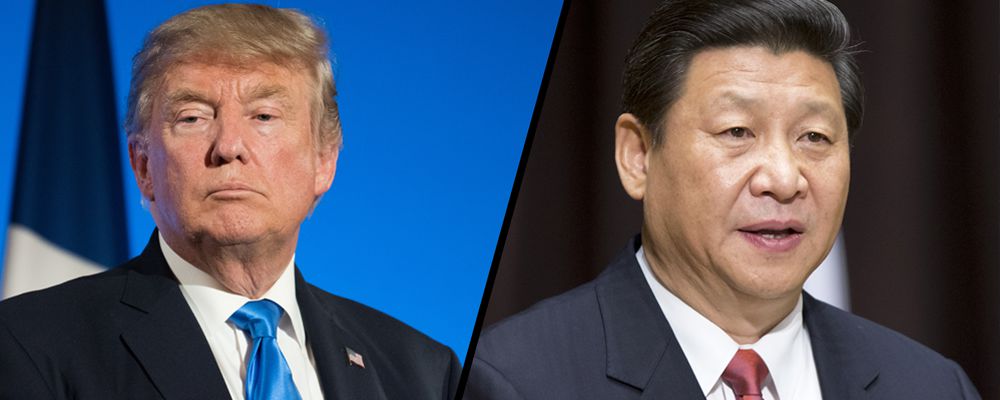Phase 1 will be a cease fire and reduction in hostilities
- Thursday, December 12, 2019
 The effects of US trade tariffs upon Chinese imports are starting to have an impact upon both USA and Chinese GDP growth. US imports from China have been falling and were down 16.2% year-on-year in October according to Trading Economics. Some of the smaller East Asian economies such as South Korea, Taiwan and Vietnam have seen production and trade gains as parts of the international supply chains have shifted towards those economies not targeted by tariffs.
The effects of US trade tariffs upon Chinese imports are starting to have an impact upon both USA and Chinese GDP growth. US imports from China have been falling and were down 16.2% year-on-year in October according to Trading Economics. Some of the smaller East Asian economies such as South Korea, Taiwan and Vietnam have seen production and trade gains as parts of the international supply chains have shifted towards those economies not targeted by tariffs.
In less than two years, the average tariff rate on US imports from China has risen from only 3% to 26%. President Trump has also called upon US corporations to seek alternatives to Chinese products.
There is clear evidence that the trade war is affecting both economies. US manufacturing and agricultural sectors have experienced a significant fall in income. This will affect President Trump’s re-election chances as these sectors are important to his base. China is also concerned about the slowing state of their economy. Some economists have suggested that 25% of the global slowdown can be attributed to this trade dispute.
The People’s Bank of China (PBoC) has been spending its US$ foreign currency reserves to prop up the renminbi, but stopped their purchased on the two occasions that Donald Trump tweeted to announce either new or higher tariff rates. The devaluation of the renminbi seems an obvious counter to increased tariffs. With tariff rates averaging 25% on all Chinese goods entering the US, the Chinese authorities could devalue their currency to match the tariff so removing the impact on American consumers. However, any devaluation of the renminbi against the US$, would increase the value of any US denominated foreign currency debt within China and prompt the flight of foreign capital from its domestic banking system.
If China devalued the renminbi by 25%, it could cost them 2% of GDP in increased interest payments and higher interest rates. While this may be manageable for a period, the flight of capital is a more serious concern. The last time Beijing implemented a currency devaluation was in May 2015. This unexpected action triggered a three-month period of stock market losses and large capital outflows that hit China’s foreign currency reserves. The inflation impact would also be significant as a 25% fall in the renminbi would imply a 5-7% additional rate of inflation. This would hit Chinese consumers directly.
If China did devalue Washington could increase tariffs further and it may also encourage other economies, such as Japan and EU, to retaliate against any devaluation by imposing their own tariffs on China. As it is, the PBoC has used its US$3tn of foreign currency reserves to defend the renminbi.
The 13th round of negotiations was conducted in October and since then there has been a cooling of tensions over a trade agreement. The areas of dispute have been separated so that a Phase 1 agreement can focus on the less contentious issues that are easiest to resolve. Washington is looking for a US$40-50bn increase in Chinese procurement of US agricultural goods such as soya in order to shore up Donald Trump’s rural support.
On December 15th, a 25% tariff on the import of US$156bn worth of Chinese electronic goods is planned to come into force. This tariff will impact US consumers more than previous actions. Therefore, if a Phase 1 agreement is reached and signed off by both President Trump and President Jinping, both sides can simultaneously roll back on past and future tariffs.
There has been uplift in stock market valuations after encouraging announcements in both Washington and Beijing. This has now been priced into stock markets meaning there is a lot of room for disappointment.
The more difficult issues will be put back to future negotiations. Given the range of issues that the Trump Administration has with China – state espionage, intellectual property theft, subsidies to state-owned businesses and the closed nature of China’s domestic market to foreign companies, it seems unlikely that a full and sustainable trade agreement will occur soon. Phase 1 will be a cease fire and reduction in hostilities. The timing of the US Presidential elections next November may encourage President Trump’s team to agree a settlement sooner rather than later.
Economic strains caused by the trade war have weighed on global growth this year. The International Monetary Fund estimates that the US-China trade war will shave almost 1% off global growth in 2019.

Chris Davies
Chartered Financial AdviserChris is a Chartered Independent Financial Adviser and leads the investment team.
About Estate Capital
Financial Services
Our Contacts
7 Uplands Crescent,
Swansea, South Wales,
SA2 0PA.
Tel: 01792 477763
